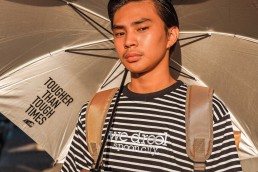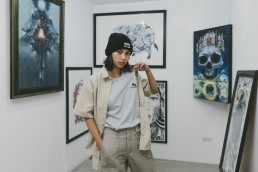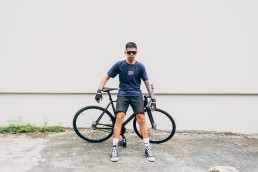
With an abrasive attitude and an authoritative voice of hip-hop, Alaric Yuson—Aric to his friends but also widely known as Anygma—has supplied a worldwide audience of hip-hop with Philippine’s unique brand of battle rap. Fliptop and Uprising are his brainchildren.
Fliptop is the number one most viewed rap battle league in the world that started in 2010 with now 7.3M YouTube subscribers and 2.2 billion views. Ask Google what the most viewed rap battle is, and Fliptop’s Loonie/Abra vs Shehyee/Smugglaz comes up with 52 million views and counting. It has amplified the careers of Loonie, Abra, Zaito, Target, Dello, Batas, Protégé, Jedli of PF, Bassilyo, Smugglaz and the like. It has birthed careers for Shehyee, Tipsy D, Sinio, Shernan, Aklas, Sak Mestro and more. It has also been viewed by the world’s best of the best—DIzaster, Oxxymoron, Eminem, and even Jay-Z—and battle leagues across the world are trying to figure how they can top it.
On the other hand, Uprising is the record label that houses Pinoy artists like BLKD, Kjah, Zaito, Apoc, and more. Together, Fliptop and Uprising are leading the way in converting casual attendees to actual supporters and is only getting stronger by the day. We had a good discussion talking shop with Aric to find out what ticks him off, his place and role in the community, and how he wants to be remembered.
FlipTop Festival 2020, a few weeks before the pandemic lockdown in Metro Manila
The Beginning
Before Fliptop rose to nationwide mainstream notoriety, Aric stood in the center piece of every Pinoy community: your everyday basketball court. His first love was basketball before eventually falling in love with poetry and the symmetry of words and beats. And as a player of the sport, it taught him teamwork, following a set of plays, sacrifice, believing in one another and yes, following through after your shot. It also taught him how to accept failures early in life, and with the right persistence, determination and putting in the work the court, results will show.
Growing up with his dad, who is a full-time writer, he was used to seeing hard work and words work together. He saw his dad do odd jobs: write his feature columns and coffee table books and even hearing of him being commissioned to write politicians’ speeches. His dad even worked as a teacher. Aric speaks of his folks with deep gratitude and concern, and even chimes in with a chuckle that his mom “likes to think she can recommend me to do something to further my career.” Unbeknownst to him, his background has cultivated his eventual art form early on.
He was just a regular kid who loves to play ball and had his share of Counterstrike addiction naming himself The Virus. Rapping to Lodi Dodi by Snoop Dogg, he was a very curious kid yet also keeps to himself—more like an anti-social kid growing up so to say. In 2012, he then decided to move out of his dad’s house to make it out on his own.
In the same spirit of inquisitiveness, he dabbled into rhyming and names like Mic, Skarm, Labjaxx, P-Flex, DJ Umph, Supreme Fist, Arbi Won, Cedric, Gabby and the entire AMPON (Absolute Messages Personified Over Noise, a hip-hop super group) became his primary go-to guys when he was starting out. They gave him the proper nudge into this deep pool of hip-hop.
“From the very beginning, I was lucky to have the accident of inclination. I was really inclined towards a lot of elements I would later on realize would make up hip-hop. I was inclined to fast-paced things, the symmetry of rhyming called out to me. The next step would be getting my hand in any kind of music that I would enjoy, then I was lucky enough to be around like-minded people,” he recalled.
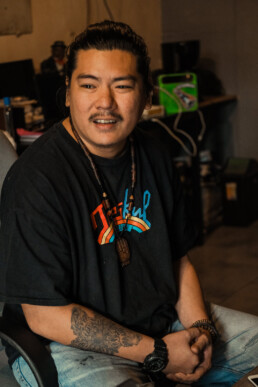
“I knew a little bit of this and that, but they were the ones who really broadened my horizons into the technicalities and aesthetics of it. Like I wanted to do certain things but didn’t know what they were called, what category they belonged to, parameters that were being done at the time – and hearing it from somebody more experienced, I get that light bulb moment–ah, pwede pala yun. (Oh, you can do it that way),” he added.
He quips this natural curiosity ‘til this day armed with a POV that there is no one there that has heard everything. He reminds people to be present and in the moment be open to the child-like discovery every single time. “Still a ton of mixtapes or hidden gems from some other collectors. There might be something from ’93 that will blow your mind.”
He then delved in battling in 2003, joining the AMPON battle event “VS” at Yero Bar in Annapolis, Greenhills and lost to Ace One. Catching the attention of AMPON, the group made a random visit to his house, made him rap, and eventually made him an official member of the then-super group. And the rest, you could say, was history.

His unique approach
When asked about his approach in how things play out for Fliptop and Uprising, he gave a candid and direct yet surprising answer: unwise.
“A lot of what we do in Uprising is not wise. We don’t really support Spotify, but it’s a case-to-case basis, to each his own. Normally, it takes one or two years before we upload music on different platforms. Some of the Uprising artists would like to have their songs available on Spotify, and some don’t. We do it based on what they want. For Dhictah’s album, a third of it is on YouTube, the second third on Bandcamp, and the remaining on Spotify. It’s not wise, but we’re happy with the few converts we get,” he explained.
Even his approach at merchandising—which many music corporations would have probably milked so much for profit—is different. While they have memorabilia shirts to commemorate their events and album launches, it’s not something they focus on.
“We, in Uprising, believe that we shouldn’t be about the merch. Fans nowadays are all about the merch, but they’re not about the music. That doesn’t sit well with us. Like, you’re going to buy a Kemikal Ali shirt, and you don’t know his song, or an Uprising pendant and you don’t even know the music. Fuck that, and because of that, we’re also not going to feed that machine. It’s all about our labor of love, to re-up the revenue in music videos. The album isn’t cheap to press as well.”
This approach may not be the usual route, but this is something that their roster of artists knows. When asked what Uprising promises the artists that join their fold, the answer was simple. “Just help in whatever area they may need or want, may it be logistics, event management, studio needs all the way to sound tech in the studio and whatever we can extend. For the most part, everyone understands that we aren’t necessarily getting rich off this.”

On keeping corporate brands at bay
When you do something so well, your fans are also these big corporations’ target market. Hip-hop’s movement is seen online, and so its fan base is world-wide, but agencies and brands only learn from what they see from afar, not knowing they are missing on a whole lot of learning if they only listened. Fliptop only had one corporate sponsor back in 2010, and they haven’t been seen with one since.
“It’s not intentional, it’s a by-product of all the years of having to deal with corporations and for the most part failing,” he started. “It’s either they can’t afford it, or they want to dictate too much which is irresponsible on my part to proceed.”
He further added, “I can’t keep wasting time trying to chase sponsors. Our resources are limited. Every single minute I spend trying to run after a sponsor is time lost fixing the match up, fixing the logistics, fixing the money that should be going to the emcees. We’ve done this by ourselves, and while it would be nice to be supported but then it comes with ‘We want to come in but our budget is this’ or ‘We want you to change this.’ We just can’t deal with that.”
He shared a story, regarding an agency meeting where Fliptop was negotiating and when the deal didn’t push through the agency people left the table saying, “Oh really, sayang naman (how unfortunate), what if in a year’s time you’ll be gone.”
“I took that personally. I understand the saying “Business is business, don’t take it personally.” But for me, even more that you should. You are the person who is behind the business. If you are going to mess with me business-wise, you are messing with me personally as well.”
Fliptop is integral in pushing talent to be heard worldwide, your local rapper may be in a show across Dubai in a day or two. Anygma and Protégé has had overseas battles a few years back. They got the respect they needed from their worldwide counter parts. That’s only the tip of the kind of work Aric and the people behind Fliptop continue to do.
Looking into the future
A lot of things changed, and Fliptop and Uprising have paved the way for hip-hop to reach such great heights. Have we reached the golden era of Philippine hip-hop? “Maybe, in comparison to previous eras but it could still get better for sure. When that happens, that can be considered the golden era then. But yeah, like most mainstream media, machinery and industry now turn to hip-hop. That’s a great thing, completely unheard of in our time, and we can only dream of that ever happening,” Aric shared.
When it comes to Filipino hip-hop persevering through times, he remains confident. Filipinos will always have something to talk about, stories to share, and thus, hip-hop will prevail. After all, we’re a third-world country facing multiple issues. Oppression brings forth the rawness of the person’s expression. That rawness intertwined with the arts becomes the beauty of the struggle. The essence of hip-hop.
“The Philippines will probably be a third world country a thousand more years. Hip-hop really is a form of struggle music. We’re not going to be better for another hundred plus years, we won’t probably run out of things that oppress us,” he sighed. “Besides, we have enough Americanism in us to be receptive to hip-hop, which can’t be said with other countries,” he added.
Throughout the conversation, it was obvious that Aric has made great strides in the industry and established his name as a formidable force, and it seems as though leadership towards him. “It [leadership] is not a position I crave for, but it keeps falling on my lap. If I were to do it, I would have to do it right. I have a good background in dealing with every kind of ego. Luckily, I just keep improving.”
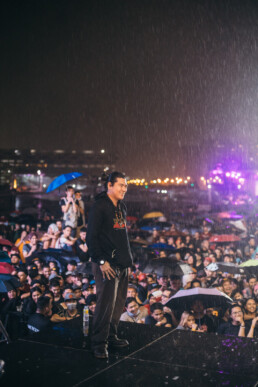

But at some point, the inevitable must be faced. Asked if he thinks about retirement, he answered ever so casually that yes. In fact, he thinks about it all of the time. “I think about retiring as the host but it’s tough. I also dream about, of course, retiring from hip-hop altogether, because I am so immersed in it. It does become a job at a certain point, so in my down time, I kind of not want to do hip-hop. But I would want to be in anything hip-hop-related for the rest of my life. If one day, someone can replace me as the host or CEO, and that means I get to start writing again. Or if I’m lucky, when I get older, I might get into beat making.”
It’s hard to distinguish Aric from Anygma in real time. He’s a stand-up man, safely thinking about how to progress for the culture and taking the people with him. He sees all sides, makes an honest decision—slow to judge people and their circumstance but makes no excuse about it. He understands passion but never loses sight of the purpose.
“People don’t have to remember me, but in case they do – I just want to be remembered as someone who did the best of my capabilities to add value to the culture.”
CREDITS
INTERVIEWER Bong Andres
WRITER & EDITOR Tricia Quintero
PHOTOGRAPHERS Jilson Tiu and Marvin Conanan
Interview and photoshoot happened in 2020
SUPPORT PURVEYR
If you like this story and would love to read more like it, we hope you can support us for as low as ₱100. This will help us continue what we do and feature more stories of creative Filipinos. You can subscribe to the fund or send us a tip.





